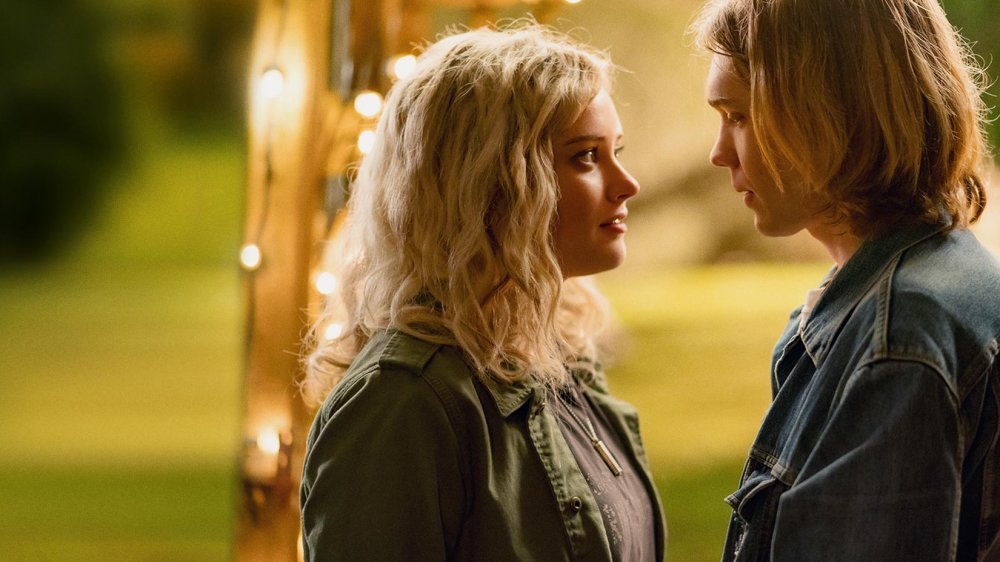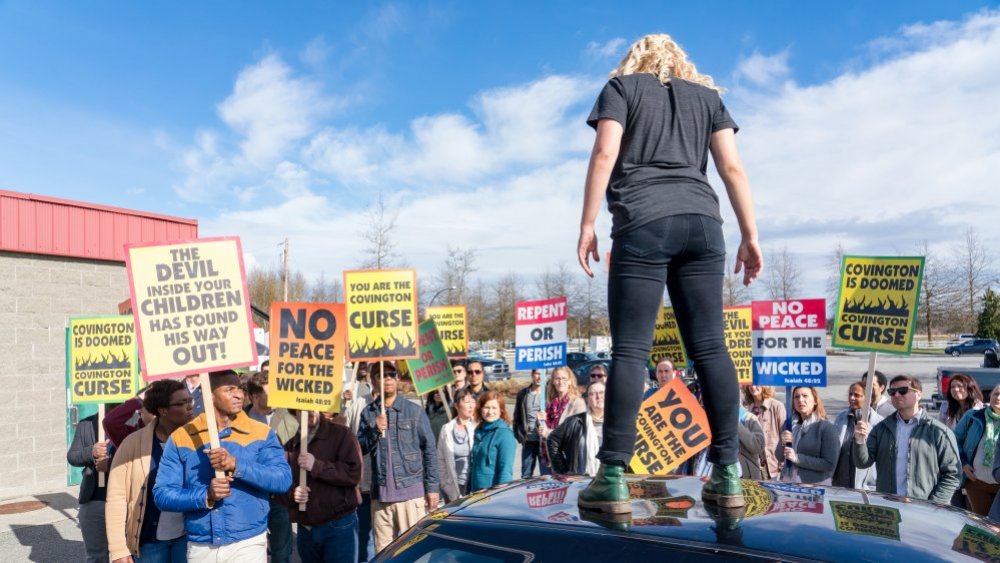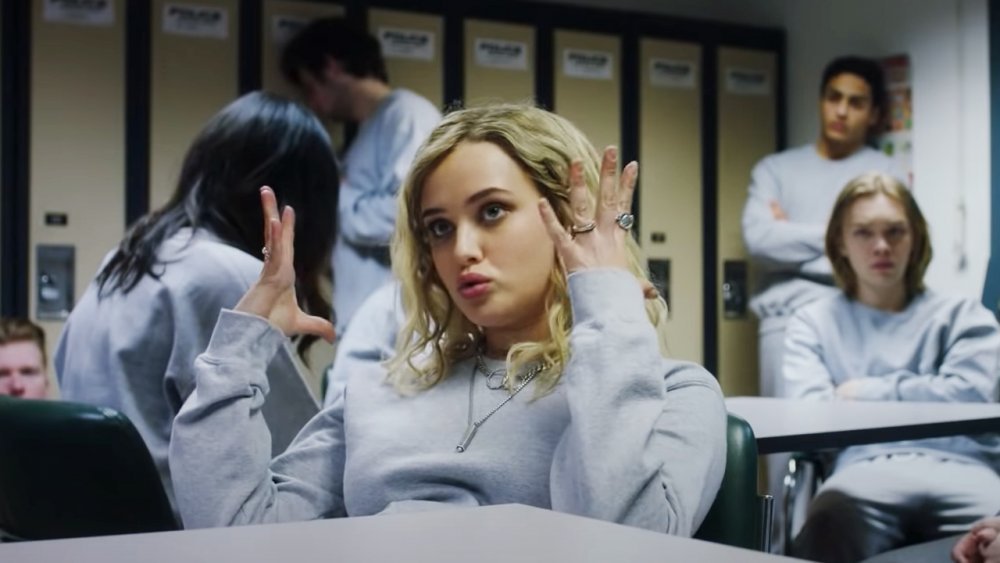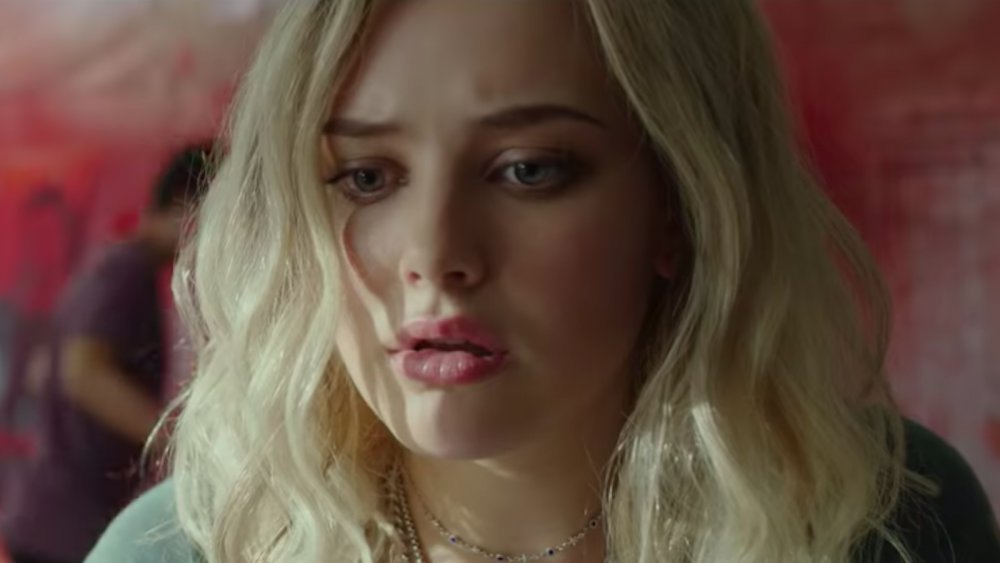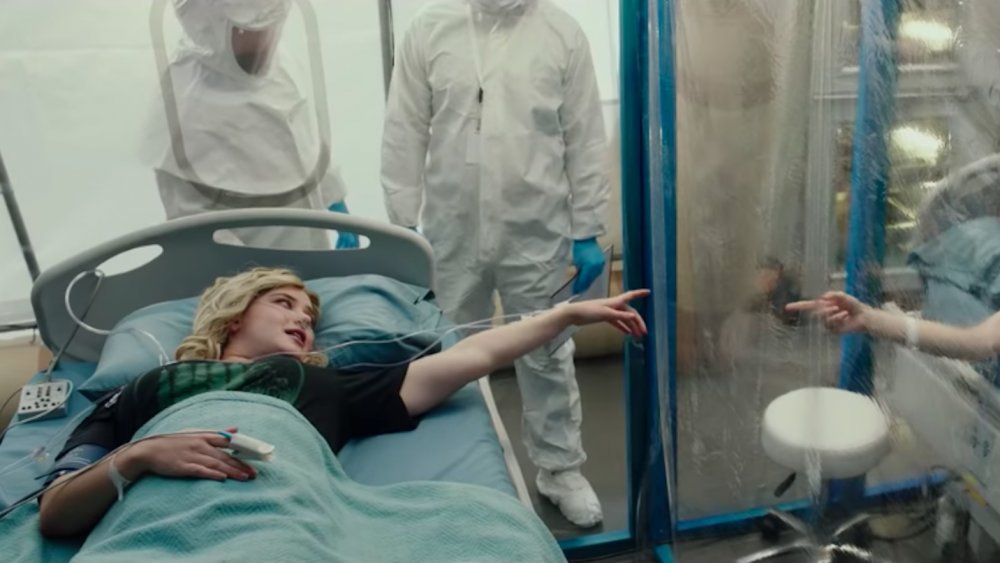Writer/director Brian Duffield Discusses His Film Spontaneous - Exclusive Interview
On the surface, Spontaneous is about exploding teenagers. It follows high school senior Mara, played by 13 Reasons Why breakout Katherine Langford, as she traverses through coming-of-age adolescence and explores love with newfound boyfriend Dylan (Charlie Plummer) as her classmates spontaneously combust around her.
Based on the 2016 book of the same name by Aaron Starmer, Spontaneous is the directorial debut of screenwriter Brian Duffield, who is best known for writing such films as The Divergent Series: Insurgent, The Babysitter, and Underwater. He also wrote Love and Monsters, which premiered just days after Spontaneous in October 2020.
Duffield has described Spontaneous as David Cronenberg (Scanners, Crash) meets John Hughes (The Breakfast Club, Pretty in Pink). And indeed, the film strikes an unusual balance between death and humor.
In an exclusive interview with Looper, Duffield delved into what influenced Spontaneous, the sociopolitical themes running through the film, and how hard it was to bring symmetry to such a unique story.
Why Spontaneous will hit home when it comes to mirroring the pandemic crisis and the current political climate
Do you hope this movie will resonate with viewers during this pandemic time?
Obviously we made it pre-pandemic, and there's part of me that really dislikes how on-the-nose it has become — we have a lot of quarantine scenes. I was watching TV and on came an animated commercial that's almost exactly like the one in our movie... like, "We know these are scary times." I just put my head in my hands. We made Spontaneous a couple of years ago, so it's very bizarre. It felt more like science fiction when we were making it. And now I see all the inaccuracies in the film about the CDC. Two years ago, I didn't know anything about the CDC, and I took liberties, because I was like, "This isn't going to happen." Now I'm waiting for people to be like, "That's not what it's like." And it's not.
Anyway, the thing that attracted me to Aaron's book was that I felt like he cracked the nut in terms of how to use spontaneous combustion in a story. It's like this thing that just randomly happens; there's no preamble — it's just this unexplainable, crazy thing. It's a tough world to put that in a movie, but Aaron used spontaneous combustion as this device about how life can throw anything at you, and how you deal with it.
When we were making the movie, it was like "don't act like someone's spontaneously combusting," because, emotionally, spontaneous combustion can represent someone having cancer or getting hit by a car. We wanted people to be able to project anything they've dealt with onto the combustion. It's this thing that's a catch-all for any crazy turn life takes that you weren't planning for and have to deal with. I think 2020 has been the epitome of that, and dealing with things that were definitely not part of the plan. You get broken apart, pick yourself up, put the pieces back together, and keep on trucking.
There's also a huge political and social undercurrent to the film. Which aspects of that angle do you think are most important?
I'm very liberal, and for me, the movie feels like a very real thing that kids are dealing with right now. Plus, I wanted to have a benchmark where I was saying, "This is what I thought back in 2018-slash-2020." I don't care that it dates the movie, because I like teen movies that are dated. The John Hughes movies are very dated, and that's what makes them great.
What's interesting is the book, which has a bigger scope than the movie does, came out at the start of 2016, and so there's a woman president in the book... she's never called Hillary [Clinton] or anything, but she witnesses kids exploding. So when I started adapting the book into a movie, I was like, "Well, this is obviously not what's happening now."
When we shot the movie, there were these things happening in the world where it really felt like kids were being like, "We need someone to help us." And it was really falling on deaf ears. I think the allusions are pretty apparent, but for us, it was about having the kids be able to voice that concern. Like when [a government official in the movie offers] "thoughts and prayers," that doesn't actually help them in the moment. And the frustration they show just felt so a part of what kids are going through these days, whether it's climate change or whatever. They're like, "We need an adult, why isn't someone being our adult?"
It's something we talked about and thought about a lot but, again, the movie was wrapped and finished well before COVID-19, and now it feels different because the pandemic response has been so politicized. It feels like even things that we didn't necessarily mean to be political, people are instantly like, "This is political." That wasn't necessarily the intention of some scenes, but, yeah, other scenes are very blatantly political on purpose.
A musician, a movie, and a mutt all influenced Spontaneous
You mentioned John Hughes, and you've described Spontaneous as kind of David Cronenberg meets John Hughes. But it also has a Gus Van Sant/My Own Private Idaho meets Heathers kind of vibe...
We talked about Gus a lot [during filming], actually. Because there's the To Die For Gus and his film My Own Private Idaho, which is one of my favorite movies, and then there's our worst nightmare — that Spontaneous would be like Elephant, [which chronicles the events surrounding a school shooting] and is so upsetting and dark. I mean, Elephant is an amazing movie, but I feel like when we say, "Oh, it's a movie about kids exploding in high school," a lot of people go to [the premise of] Elephant. And we're like, "No, we want to go for To Die For Gus, a little bit more than the Elephant Gus." But he's so great.
If you could pick one or two people or things that influenced you on this, what would they be?
Well, just because you didn't say I had to do movies... Sufjan Stevens' album Carrie & Lowell was really huge for me, because he wrote it about his parents, and death is part of it, but it's also really funny, and just gorgeous. I listened to it on loop, basically, and the movie ends with a song from it. So that was really a big touchstone, because it's a movie about grief but it's not supposed to be depressing, which was an interesting tonal challenge. Like, how could we have a movie where people are dying and we're taking it seriously but keeping it on a lighter tone?
It's funny, I see my dog a lot in the movie, which is a weird one. I have a little Jack Russell mixed mutt, and whenever she's tired or scared, she'll go under the bed. And in my nerdy dog-owner life, I learned that's because animals do that because they want to feel secure enough that a predator can't flip them over and eat their belly. So that made its way into the movie. And there are other things that Mara does that are inspired by my dog, which is really bizarre. But I was like, "When my dog is scared, she does this self-protection, cocoon kind of thing." And visually I thought that was really interesting, and it became a chunk of Mara's experience in the movie.
And I'll say Heathers too, just because it's Heathers. I love Heathers, but it treats death a little sillier. And I don't mean that in a negative way. It's incredible what they do in that movie. But I really wanted the characters that die in Spontaneous... you see their parents are upset. People are upset.
Spontaneous stirs up a lot of emotions while approaching everyday events in an unusual way
As a viewer there were definitely a lot of different emotions going on, and the storyline took some twists and turns...
Yeah, I love tropes, and genre tropes. And one of the fun things about Spontaneous is that it has all the things you expect in a young adult movie. We really worked to figure out how to make sure we hit the mark. Part of that was to do things that are a little different than what you might expect, and they hit a little bit harder. We have characters die a lot earlier than people might expect. And we also don't do the someone-really-important-in-the-movie-dies-five-minutes-from-the-end kind of thing. Playing with that surprise of "there's only X amount of time left," it throws the audience off a little bit.
But all the teen touchstones are still there, we check off prom and all of those things. But it's a little bit like, "I know I'm at prom, which is part of every teen movie, but things are a little different at this prom. I don't really know what to expect because the things I normally would expect can't happen." So that was fun to play around with, in the weird cocktail of the movie. And in a weird way, cocktails were something I thought about a lot. Because a lot of them are disparate ingredients that you might not think go together but if you put them together, you're like, "That's actually delicious." So, there's a cocktail scene in the movie, and I definitely find that I'm inspired by things like, "The movie is like a cocktail, or Mara is inspired by my pet." I feel like I weave this weird spiderweb, and that it makes sense to me, and hopefully to other people as well.
Talking about prom and teenage experiences like that, how did you get back into that headspace of being in high school, of being a teenager?
Well, I was homeschooled for high school, so it was doubly weird for me because I didn't have that experience. I graduated high school, but I did not have the full high school experience. I grew up overseas and feel like I had the first remote learning experience that everyone's going through now. And it's like, "I did that for two years." And it was great and terrible.
But for me, one of the nicest things was casting a movie that's all high-schoolers, or kids that were very recently in high school. They're not subtle about things that aren't true. If something wasn't right, they're not afraid to be like, "This isn't what it's like." So relying on people younger and smarter than me for that kind of stuff was a big help.
How Brian Duffield was able to balance humor with exploding teenagers
What are the challenges of writing these kinds of strange coming-of-age stories and getting the characters to feel like real people experiencing all of it?
A big part of it is humor. A lot of movies play things really seriously. But in my experiences throughout life, I feel like I always remember really human, funny things happening during funerals, or in the hospital. It's not like people are being comedians, but I think so much of the human experience is how we deal with things that are bigger than us, and we kind of deal with it by not dealing with it. So humor was a really important part about Mara and Dylan, but they're also on opposite ends of the spectrum.
When the movie starts, a kid explodes, and Charlie's character instantly accepts it and goes, "I could die right now, and I've been waiting for college to do XYZ. I've just been assuming I'm not going to reach out to the girl that I had a crush on, because I was going to move in six months." And he just instantly throws caution to the wind, not in like a bucket list kind of way, but just in a way of like, "I wish if someone liked me, they would just tell me they liked me. And, in case I die tomorrow, I'd be like, 'Cool, a girl liked me.'"
And then Katherine's character spends the whole movie on the flip side of that, where she just doesn't want to deal with what's going on. She tries drugs, booze, and even uses Charlie as a distraction from what's going on. It takes her a long time to get to the point where Dylan was at the start, but because they are at such different ends of the spectrum, Charlie has this weight off of his shoulders where he's like, "I can breathe." Like, "I'm not worried about getting the SAT scores like I used to be, I'm just able to enjoy the moment." And Katherine is so desperate to not acknowledge what's going on that she's like, "I'm going to use humor to deflect from the moment." And so then there are these two characters that just really want to have fun, for different reasons. So putting them together really makes both of them enmeshed in each other. They obviously adore each other, but they're coming from two really different places. And Katherine, eventually at the end of the movie, gets to where Charlie was at the start of the movie.
For me, it was using humor and levity to deal with the fact that 40 kids are dying in 90 minutes. I just watched a movie recently that was really serious about a really serious subject, and the whole time I just kept wishing it was funnier because a part of me just doesn't believe that a lot of the serious things people are going through are just met with people somberly staring at each other and saying very serious things.
You wrote another film that just came out, Love and Monsters, which has some tonal elements in common with Spontaneous, like an inexplicable threat — spontaneous combustion versus monsters — and, like you said, that throw-caution-to-the-wind love story. Why do those themes resonate with you?
I haven't seen Love and Monsters yet, so I can't speak too much to it. But, in terms of Spontaneous and other things that I've done, what's interesting to me is doing something that's a little familiar but a little left of center. There are other high school movies that deal with all the same things as this, just in a regular high school setting. But when you add this kind of really bizarre element to it, with the spontaneous combustions, it feels very unusual. You're like, "I don't really know what to expect with this." And then you watch it and you're like, "Oh, I get it."
With Love and Monsters, I was single when I wrote it, and it was about a single guy who had never had a girlfriend, and he knows there's another single girl however many miles away. And he's like, "I just want to ask her out, and if I don't ask her out, I'm just going to stay in this bunker my whole life." But there's monsters and everything all around him. But he doesn't want to be scared to ask this girl out on a date. So that script was about loneliness, and how you put all your expectations on other people to fix your problems. You'll even go to great lengths to be like, "If I just defeat all these monsters, I can get to this girl, and then I'll be a complete person." And that's not usually how relationships work out. Love and Monsters could have just been a movie about being single and putting those elements in it, but then you add monsters, and it's much more of an interesting take on a movie about someone that's lonely, as opposed to it just being about a guy who is bad at Tinder.
For me, it's what are those little things that are unusual or different that you can have fun with visually and explore different themes? At the same time, once you have watched the movie, it's not that different from something you would expect, but it's presented in a different way, with a different recipe, which makes it fresher or more enjoyable. That's the goal, anyway.
Spontaneous is now available on Premium Video On Demand and for Digital purchase.
